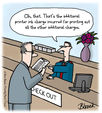Monkey Predictions
- Mo Lidsky
- Mar 24, 2017
- 2 min read
...excerpt from Mo Lidsky's latest book, Partners in Preservation
With the advent of countless technologies that have put infinitely more information at our fingertips, we have become no better at economic predictions. There are those that sell the message that not only do we perfectly understand what is happening today but we are also pretty damn confident about what it will mean for the future. Whether it’s on Bloomberg, CNBC, BNN (in Canada), or any other channel that propagates market predictions, there is no shortage of investment gurus and economists confidently explaining the market to us.

The reality is that these opinions are most often useless and often detrimental to investors. In fact, when finance academics John Graham and Campbell Harvey studied stock-predicting newsletters, they came to two conclusions. First, results of these prediction newsletters were so atrocious that they questioned whether the predictions were arrived at by chance. And second, they found that one would be more successful finding the worst of the newsletters and doing the opposite of what they recommended. It is not what anyone wants to hear, but the truth is that the world is far more complex and unpredictable than a newsletter, an algorithm, or a cable news show would have us believe.
There is no shortage of similar stories, whether it is the one about the Playboy models whose stock picks outperformed most mutual fund managers, or the one where Orlando the cat defeated three money manager opponents in a stock market challenge, or the one of Burton Malkiel’s one hundred blindfolded monkeys that outperformed the index. Stock market forecasters are unreliable in the short run, and analysts tend to be fairly poor prophets. Perhaps that is why Mark Twain was once quoted as saying, “The best way to make money from stocks is to sell investment advice.”









Comments